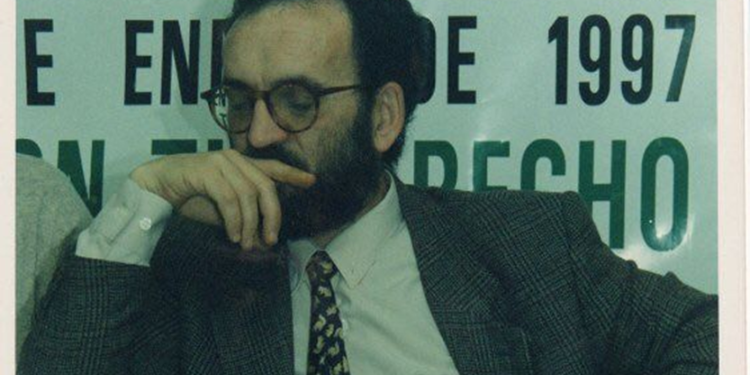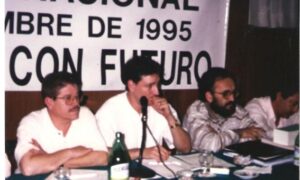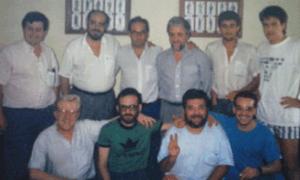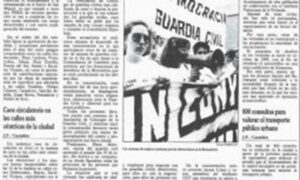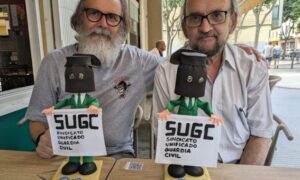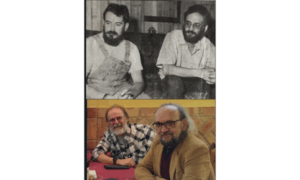José Morata: “Returning to the Civil Guard is closing a cycle that began with repression and ends with dignity.”
Interview with José Morata, one of the founders of AUGC, civil guard expelled from the Corps who is now returning to his position: the Civil Guard.
In a force where for decades speaking out was not allowed, José Morata was one of the first to do so. In the 1990s, he promoted the creation of SUGC (Sindicato Unificado de Guardias Civiles) a clandestine union within the Civil Guard, at a time when joining was punishable by sanction. He paid a high price for it: he was expelled from the Civil Guard. But on the 20th of June 2025, more than 25 years later, and after hard and constant institutional work by AUGC, justice is finally being done.
José Morata not only represents a story of personal struggle, but also a symbol of the democratic transformation of the Civil Guard. His reinstatement marks a turning point: what was once punished is now respected. In this interview, we review his career, his toughest moments, and what it means to put on the uniform again.
Because this isn’t just the story of a Civil Guard. It’s the story of a victory.
- José, what went through your mind when you received the notification allowing you to rejoin the Civil Guard after so many years?
30-year wait. The law was passed in July of last year. It came into force in December, and that same month we began the administrative process for the reinstatement request by the DGGC and the Ministry of Defense, in compliance with the provisions of the aforementioned law. On May 29 of this year, the Minister of Defense signed the favorable resolution, , published on 20 June 2025 in the Official Gazette.
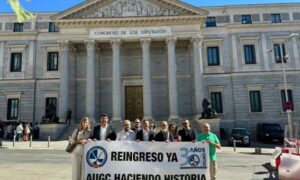
Congress allows the reinstatement of expelled Civil Guards. Members of the AUGC on July 11 in front of the Congress of Deputies.
- Let’s go back to the 1990s. How did the idea of creating a clandestine union within the force come about?
The origins date back to 1976, when the Civil Guard and Armed Police first demonstrated in Madrid demanding inclusion in Social Security. From that date on, there were various clandestine attempts in different provinces to unite the discontent within the ranks of this Corps over the Third World and near-slavery situation in which we lived. No days off, holidays at the discretion of the Chiefs, 8×8 or 24 hour work days, strict discipline, submission to the Military Penal Code, totally obsolete material, housing without the right to inviolability, life in the barracks subject to the whims of the feudal lord in charge of the Unit that even included restrictive rules on the conduct, clothing and behavior of our wives and children, no relationship between the bases and the commands, even with those immediately following them, lack of any of the rights that the Constitution recognized to citizens, obligation to reside in the destination town, no freedom to move to other towns without the corresponding permit, obligation to wear the uniform even in your free time, etc.
In 1978, the Armed Police was demilitarized, creating discontent and grievance among the ranks of the Armed Police for not having extended this status to this Corps. In 1980, with the demilitarization, the first unions were created within the PN to defend the interests of its members.
These clandestine movements within the Civil Guard were unsuccessful due to the strict discipline that existed and because anyone suspected of militancy was immediately expelled or arrested. This was until 1986 when, following the arrest of Corporal Rosa and its publication in the national press, the movement was revived, and cells of the SUGC (clandestine) were created in most provinces. This movement, with its own compartments to prevent its members from being identified, achieved great impact in the national and regional press and in other media, including radio and television, until 1992, when, due to the fierce repression and arrests of its main leaders, it was finally dissolved. To bring about the end of the SUGC, the Civil Guard organized Operation “Columna” at the national level, assigning members of the anti-terrorist investigation groups to carry it out and separating them from their work pursuing the SUGC.
Subsequently, in August 1994, the Coproper association (now AUGC) was legalized and, after years of hard struggle against the Administration, achieved recognition as the current professional associations.
- Were you aware at the time of the consequences that this decision would have on your career?
From the very beginning. By fighting for the rights of the collective, I knew that my professional career would end there and that we would end up being arrested and prosecuted for military sedition, resulting in expulsion from the Corps.
- What was the hardest moment of the whole process?
In general, the arrests made in 1989 and 1990, our incarceration in military prisons, and our prosecution on charges of military sedition, with a request for sentences of 8 to 12 years in prison.
But, on a personal level, the hardest moment for me was the suspension of the General Assembly of the Mutual Benevolent Association of the Civil Guard, which was supposed to have taken place on December 15, 1989.
A fact unknown to most GCs is that, following several complaints to the General Directorate of Insurance and the Ministry of Finance, these bodies forced the Civil Guard to hold elections to fill the management positions of said Mutual, which until then had been held by senior officers of the Corps, appointed directly by the Directorate.
November 2, 1989, ballot boxes were installed for the guards to cast their votes. It was a complete humiliation for the GC commanders. Ballot boxes were in the barracks. The command attempted to boycott them, but the SUGC managed to secure the appointment of comrades as observers in many Command Posts to oversee the fairness of these elections. On average, barely 40% of colleagues voted. In Command Posts where the SUGC was implemented, such as Toledo and Castellón, 55% cast their vote.
The militant comrades of the SUGC who presented themselves took the majority of the votes (for example in Toledo they achieved 70% of the votes).
But days before the General Assembly was to be held, where the executive positions were to be elected (those from the SUGC were to fill almost all the positions, including that of President, which was to be my own), General Francisco Millán, then President, refused to hold the meeting. Months later, the Government dissolved the Mutual.
It was a regrettable event, because if the new Board of Directors had been elected, it would have carried out an audit to examine the situation of the Mutual (there was a study by a specialized firm, which, despite the limited information received, estimated the existing embezzlement at more than 50 billion pesetas. At the time of the dissolution, the Government itself estimated that there were deficits amounting to 15 billion pesetas) and would have taken the top brass of the Civil Guard to court, with the ensuing national scandal.
It was a missed opportunity to achieve the democratization of the Corps. Had we achieved this, we would have made many years’ progress toward achieving our demands.
- How did your family or loved ones handle the whole process?
Pretty good. They helped me in my work and were aware of the future we were facing.
- Since your expulsion, what has changed in the Civil Guard regarding association rights?
Considering I was expelled in 1997, I’d say comparing Coproper with AUGC is like comparing night and day. During the Coproper time, we were still persecuted, just as we were during the SUGC. A letter from the Directorate General (DG) was even sent to all units falsely reporting that we were illegal, attempting to halt our strong advance. We had to win all our achievements in court.
- What role do you think AUGC has played in this path toward the internal democratization of the body?
Both AUGC and Coproper have played a vital role in the democratization of the Corps’ structures. Coproper was the first, and as a result, it took all the blows and suffered internal repression from the leadership. Later, over the years, others began to appear. But the one that started this whole tsunami, let’s not forget, was Coproper (now AUGC).
- Do you now feel vindicated, or is there still a debt the State owes you?
With my reinstatement, I will never be able to say that I have been vindicated or that the rights that were taken from us expelled were fulfilled. There is no way to compensate for the damage caused by 30 years out of the Corps due to expulsion.
- What is your message for young Civil Guards who are currently part of AUGC or other associations?
Let them study or learn about the history of their predecessors, the way they performed their work, and the way they lived. Fortunately, today, all of this has changed 500% for the better. But let them keep in mind that this new Civil Guard they enjoy has been achieved thanks to the struggle of the various existing associations. Let them join them, whichever they may be, and collaborate in their structure and operation. Let them not allow them to die for lack of replacements. Let them imagine what would happen to the workers of this country if unions didn’t exist. Without them, there would be no rights.
- What do you expect from this new stage in the Civil Guard?
Nothing. Because of our age and the years we’ve spent, those of us who were expelled are now retired. The pardon has come too late.
- Finally, if you look back, would you do the same thing again knowing what happened?
That’s not even a question. I’d do the same thing again and get involved in the fight anyway, despite the heavy price tag.

